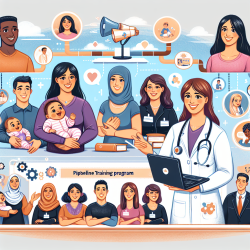Introduction
In today's rapidly evolving healthcare landscape, the need for a diverse and representative workforce is more critical than ever. The research article titled "Maternal and Child Health Pipeline Training Programs: A Description of Training Across 6 Funded Programs" highlights the importance of such diversity in the Maternal and Child Health (MCH) sector. This blog will explore how practitioners can enhance their skills by implementing the outcomes of this research or by engaging in further research.
The Importance of Diversity in MCH Workforce
The MCH Pipeline Training Programs (MCHPTPs) were initiated to address the under-representation of racial and ethnic minorities in healthcare. These programs aim to create a healthcare workforce that mirrors the community it serves, thereby reducing health disparities and improving healthcare outcomes.
Data from the research shows that from 2007 to 2019, over 5,000 undergraduate students completed MCH Pipeline Training. In the 2016–2021 funding cycle, six programs were strategically located across the United States, focusing on recruiting students from underrepresented backgrounds.
Key Strategies for Practitioners
1. Recruitment and Support
Practitioners can learn from the recruitment strategies used in MCHPTPs, which include:
- Collaborating with campus offices of diversity and inclusion.
- Engaging with student organizations targeting underrepresented minorities (URMs).
- Direct recruitment by faculty and current trainees.
Supporting student persistence is equally crucial. Financial support, mentoring, and creating a sense of belonging are essential components that practitioners can implement in their programs.
2. Mentoring and Professional Development
Mentoring is a cornerstone of the MCHPTPs. Practitioners should focus on establishing meaningful mentoring relationships that promote self-worth and confidence among students. This involves:
- Providing close academic advising and research mentoring.
- Offering guidance on professionalism, emotional intelligence, and resilience.
- Addressing challenges such as imposter syndrome and structural racism.
3. Research and Exposure
Research exposure is vital for students’ growth and persistence in healthcare fields. Practitioners should facilitate opportunities for students to engage in research projects, which can include:
- Encouraging participation in research conferences.
- Providing mentored research experiences.
- Integrating research into the curriculum.
Pipeline to Graduate Education and Workforce
The MCHPTPs aim to support students' progression from undergraduate education to graduate training and eventually into the MCH workforce. Practitioners can emulate this by:
- Offering professional development opportunities.
- Assisting with graduate school application processes.
- Providing emotional and social support to navigate family and cultural expectations.
Conclusion
The MCH Pipeline Training Programs are instrumental in preparing the next generation of MCH leaders. By implementing the strategies and outcomes highlighted in the research, practitioners can enhance their skills and contribute to a more diverse and effective healthcare workforce.
To read the original research paper, please follow this link: Maternal and Child Health Pipeline Training Programs: A Description of Training Across 6 Funded Programs.










